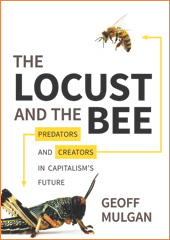Time Rather Than Money
What is the ultimate goal for economic life?
August 17, 2013

Capitalism’s defining idea is the search for value in a manner that can be exchanged and monetized. Capitalism makes money the common currency of life and sees anything and everything through that lens.
Yet, money can only ever be a means — even if the miser takes it as an end. It is a means is to enhance life in some way, through better places to live, better food to eat or better clothes to wear.
When capitalism is a means to these ends, it thrives. But when it appears to lose sight of this, when it makes life subservient to money, its legitimacy is called into question.
For anyone living rationally and wisely, the quality of life will always be a higher value than money or consumption. We only live once and every step of life is a step toward death. As consumers, we may occasionally be drawn to the modern equivalent of grave goods. But compared to our ancestors, we are less likely to be fooled by their significance.
If capitalism is at heart a system for the realization of exchangeable value, its successors may be systems for the realization of meaningful time. This includes both the time of lived experience and the much longer cycles of biographical and ecological time.
Capitalism showed the world as controllable, amenable to manipulation and adaptable to human desires. This may have often led to hubris.
But capitalism was also liberating, at one with life, when it sought out the things and places that were dormant, dead and unrecognized, when it tried to animate them and render them productive.
The same mentality of the capitalism we are all familiar with can be applied to time: seeking out where and when it is wasted, dormant, unsatisfied and unrecognized — and then finding ways to bring it to life.
If time becomes the primary, and most visible currency of life, what follows? Money is frozen time; capital is frozen work.
All of the numbers of a capitalist economy are numbers in time: discounted, forecast or hedged.
Capitalism provided new tools for thinking about time and managing in time, beyond astronomy and observation of the heavens, and it showed time to be not given or determined by fate.
So how might its techniques and methods be spread to encompass the quality of lived time? There are some simple implications, many of which are already visible.
If as much attention is paid to time as is now paid to money, we can expect proliferations of time accounts, time banks, time exchanges, time rights and time credits. All of these instruments allow people to store time or to swap it with others.
We might expect ever more rights linked to time—including rights to paid and unpaid leave, rights to training time, rights to adjust the fixed hours of the working week.
We might expect educational institutions devoted to helping people use time more effectively. Imagine schools of life as well as schools to prepare for work, and coaches skilled in pointing out to people how they might use their time more effectively.
None of these are fantasies or utopian. All exist already, though on nothing like the scale of their equivalents in and around money.
We should also expect an economy in which more attention is paid to happiness and fulfillment in time. I am not referring just to the happiness experienced in the moment (which researchers track by asking people to tell a monitoring machine how they feel). It can also encompass the happiness or satisfaction we experience retrospectively, for example our appreciation of an unusual holiday or friendship.
We can already see new industries growing up around pleasure and experience. They encompass everything from carefully constructed experiences of exhilarating danger to drugs and therapies or stimuli to parts of the brain. Education systems can teach us to better understand happiness in time. This helps remedy our poor track records in judging our own experiences and what will make us happiest.
We might also expect more attention to be paid to the productivity of life beyond work. The data show that only a minority of our time—about 23% of our time spent awake—is now devoted to paid work.
In contrast, we spend more than three-quarters of our adult lives engaged either in “unpaid work”—cleaning, washing, looking after our kids, building flat-pack Ikea furniture and mowing the garden lawn—or in leisure—playing sport, shopping, reading, watching TV, etc.
Even though we have now had two generations of labor-saving inventions, they have still left the home as a place where we have no choice but to spend large slices of time. This includes essential care and maintenance, whether for our children, our pets, our homes, our gardens and ourselves.
The richest people will contract most of these roles out. Many even on middle incomes pay others to clean their homes or look after their children. But seen in the long view, what’s remarkable is how little these figures have changed.
If the data are to be believed, parents spend more time with their children now than 40 years ago. Having children doesn’t make people either happier or less happy overall. But the combination of genetic impulse and the search for love and fulfillment clearly animate people to devote time and energy to family life as much as ever before.
Finally, a society that was more attentive to time would reverse the relationship between time and money that is found in contemporary economics. Time is the servant of money, there to be carved up, measured and managed in order to increase monetary profit.
So what would happen if the relationship was inverted, and money became the servant of our aspiration for more and better time? That’s the brave new world to aspire to.
Editor’s note: This essay is adapted from The Locust and The Bee: Predators and Creators in Capitalism’s Future by Geoff Mulgan (Princeton University Press, 2013). Published by arrangement with the publisher. Copyright © 2013 by Princeton University Press.
Takeaways
When capitalism makes life subservient to money, its legitimacy is called into question.
The quality of life will always be a higher value than money or consumption.
Capitalism showed the world as controllable and amenable to manipulation.
We should expect an economy in which more attention is paid to happiness and fulfillment in time.
More attention will need to be paid to the productivity of life beyond work.
Read previous

What Really Ails Detroit
August 16, 2013
